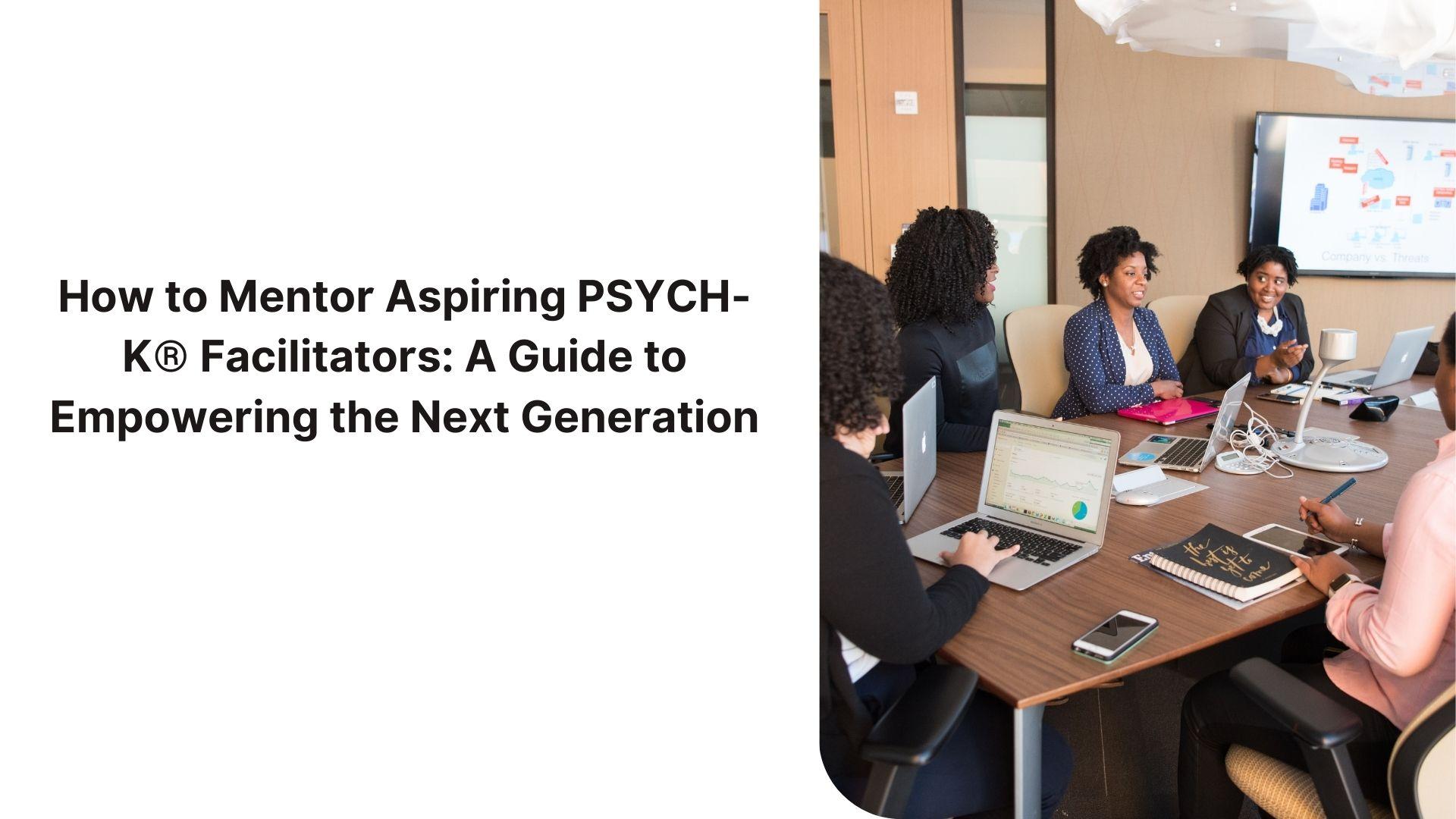How to Mentor Aspiring PSYCH-K® Facilitators: A Guide to Empowering the Next Generation

Mentoring aspiring PSYCH-K® Facilitators is more than just sharing techniques — it’s about nurturing a new wave of transformational leaders who will go on to help others shift limiting beliefs, enhance well-being, and live empowered lives. As an experienced PSYCH-K® Facilitator, you have the wisdom, experience, and insight to guide newcomers on their journey. In this article, we explore the essential components of effective mentorship, how to foster growth in others, and how mentoring strengthens both the mentor and mentee within the PSYCH-K® community.
The Importance of Mentorship in the PSYCH-K® Community
PSYCH-K® is a powerful modality rooted in subconscious change, neuroscience, and the integration of mind, body, and spirit. While workshops offer foundational training, the real transformation often begins after the workshop ends — when facilitators begin applying their skills in the real world. Mentors help bridge this gap by providing support, encouragement, and guidance.
By mentoring aspiring facilitators, you:
-
Amplify impact: The more facilitators you help empower, the more people around the world can access the benefits of PSYCH-K®.
-
Cultivate confidence: New facilitators often feel overwhelmed. A mentor helps them find their footing.
-
Ensure integrity: You can help uphold the standards and spirit of PSYCH-K®, ensuring the practice is used respectfully and effectively.
Step 1: Set the Intention of the Mentorship
Start by setting clear intentions for the mentorship relationship. Discuss the goals with your mentee:
-
Do they want support with integrating what they’ve learned?
-
Are they preparing to launch a practice?
-
Do they need help working through their own beliefs as a facilitator?
By establishing mutual expectations, you create a safe, respectful, and purposeful space for growth.
Step 2: Share Your Personal Journey
One of the most valuable gifts you can offer as a mentor is your own experience. Share:
-
How you got started as a facilitator
-
Challenges you faced and how you overcame them
-
How PSYCH-K® has changed your life and practice
-
Tips for integrating PSYCH-K® into different life or professional domains
This builds trust and helps your mentee see that growth is a continuous journey.
Step 3: Help Deepen Understanding of Core Principles
Mentoring isn’t just about reviewing processes — it’s about embodying the principles behind them. Reinforce key elements such as:
-
The importance of permission protocols
-
The sacredness of the facilitator-client relationship
-
Trusting the innate wisdom of the subconscious
-
The power of intention and alignment
Use case examples or hypothetical scenarios to explore the nuance and depth of facilitation.
Step 4: Provide Opportunities for Practice
Practical experience is essential for building confidence. As a mentor, you can:
-
Offer supervised practice sessions with constructive feedback
-
Role-play difficult client scenarios
-
Observe sessions (with consent) and debrief afterward
-
Help mentees learn to navigate uncertainty and self-doubt
Encourage them to practice with peers, family, or in volunteer settings as they refine their skills.
Step 5: Support Personal Growth and Inner Alignment
A great PSYCH-K® Facilitator is always working on themselves. Support your mentee by:
-
Encouraging them to identify and shift their own limiting beliefs
-
Modeling self-inquiry and personal integrity
-
Suggesting relevant PSYCH-K® balances for self-use
-
Celebrating their breakthroughs and acknowledging their growth
Remind them that their personal alignment directly affects the quality of their facilitation.
Step 6: Encourage Professional Development
Help your mentee prepare for the professional side of being a facilitator:
-
Share resources for building a practice (marketing, client communication, etc.)
-
Discuss ethical considerations in client work
-
Recommend advanced PSYCH-K® workshops for continued learning
-
Offer support around pricing, boundaries, and session structure
Mentorship in this context also includes sharing the realities of self-employment or integrating PSYCH-K® into existing modalities.
Step 7: Stay Connected and Celebrate Milestones
Create a structure for check-ins — weekly, biweekly, or monthly — depending on your mutual availability and the mentee’s needs. As your mentee begins facilitating on their own:
-
Celebrate their first client session
-
Offer support through challenges or difficult experiences
-
Recognize their unique strengths and facilitation style
Long-term mentorship may evolve into a collegial or peer relationship, where both parties continue to grow together.
Qualities of an Effective Mentor
To mentor aspiring PSYCH-K® Facilitators well, embody the following qualities:
-
Patience: Learning takes time; every facilitator grows at their own pace.
-
Compassion: Many mentees are working through their own healing while learning to support others.
-
Integrity: Demonstrate ethical practice, humility, and transparency.
-
Inspiration: Be a living example of how PSYCH-K® can transform lives.
-
Presence: Listening deeply and holding space is just as important as giving advice.
The Ripple Effect of Mentorship
Every mentee you support goes on to help others — clients, communities, and perhaps even future facilitators. Through mentorship, you create a ripple effect of transformation, expanding the reach of PSYCH-K® far beyond what any one facilitator could achieve alone.
In turn, you will continue growing too. Mentoring invites you to revisit the basics with fresh eyes, stay humble, and refine your own facilitation through teaching. It’s a path of mutual evolution and shared purpose.
Final Thoughts
Mentoring aspiring PSYCH-K® Facilitators is a sacred responsibility and a profound opportunity. It’s a way to give back to the community that supported you, and to ensure that PSYCH-K® continues to thrive with integrity, compassion, and effectiveness. Whether you mentor informally or through structured programs, your guidance has the power to shape the future of this transformative modality — one facilitator at a time.
- Art
- Causes
- Crafts
- Dance
- Drinks
- Film
- Fitness
- Food
- Игры
- Gardening
- Health
- Главная
- Literature
- Music
- Networking
- Другое
- Party
- Religion
- Shopping
- Sports
- Theater
- Wellness


